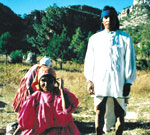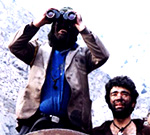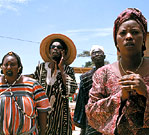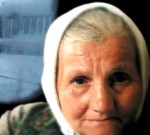cinema vintage
Festival’s competition section; projected on the big screen at the OPEN AIR CINEMA on Manzioli Square. Films are competing for the audience award, which will assure Slovenian cinematographic (and other) distribution for the winning film.
cinema vintage programme

» THE PASSION OF MARIA ELENA
(La pasiĂłn de MarĂa Elena), Mercedes Moncada RodrĂguez, Mexico, 2003, 76′
The passion of justice with a face of a mother, desperate to lave her name and regain honour.
- D & S: Mercedes Moncada RodrĂguez
- C: Javier MorĂłn Tejero
- E: Viviana Garcia-BesnĂ©, Mercedes Moncada RodrĂguez
- SO: Miguel Jaramillo, Luis Arau, Samuel Larson Guerra
- M: Café Tacuba, Martin Chavez, Samuel Larson Guerra
- P: Mercedes Moncada RodrĂguez, Javier MorĂłn Tejer
- CA: Maria Elena Duran Morales
Young, divorced mother Maria Elena from an Indian tribe Raramuri, which lives in the mountain region of northern Mexico, abandons her community in order to escape quarrels with her ex-husband and to find herself a job in the Chihuahua city. In August 1999 a truck runs over and kills her three years old son in the middle of the city. Truck’s driver, a white Mexican, daughter of a rich landowner, escapes from the scene of the crime. Later she confesses her crime and apologises in front of the traditional court of the Raramuri tribe, but denies her statements in front of the official Mexican court. Old-fashioned tribal community, where divorce is considered as highly inappropriate for females, blames Maria Elena for the death of her child. In their eyes she is guilty because she gave up traditional ways of life. Maria Elena decides to legally prove she is not guilty for the death of her sin and become part of her community once again. But Mexican legal order turns out to be a hellish passion for Maria Elena: instead of justice she keep
running across discrimination and corruption.
The Passion of Maria Elena is a beautiful example of searching for the proper form, which through its soul-stirring story brings to life the culture it explores. (Howard Feinstein)
Festivals, awards (selection): Sundance 2003, IDFA Amsterdam 2003; Mayahuel Best Film Award - Guadalajara 2003, Best Documentary Award - Sao Paolo 2003.

» TINY SNOWFLAKES
(Danehaye rize barf), Ali-Reza Amini, Iran, 2003, 80′
Waiting for Godot - iranian and poetic.
- D,S,E:Ali-Reza Amini
- C: Tooraj Aslani
- SO: Mohammad Reza Yousefi
- M: Mehrdad Nosrati
- P: Ali-Reza Amini (Documentary and Experimental Film Center)
- CA: Mohsen Tanabandeh, Majid Bahrami
Two watchmen guarding a mine live in an isolated, semi-deserted kind of hamlet in the mountains. To survive their extreme solitude, they have created their own world, made up of games and objects which assume fundamental importance in their lives. A little dog, a radio, a woman’ s shoe, a female silhouette frequently glimpsed on a steep path feed the imagination of the two men, giving them a reason to live. A man on a motorbike, who delivers them different goods, and a team of miners are the only ones to occasionally interrupt their isolation…
“I studied theatre, but I always wanted to work with film. When directing Tiny Snowflakes, I based the story on the text of Samuel Beckett’s Waiting for Godot, written after the second world war. I read the text as a student, it attracted me strongly and at first I wished to put it on a theatre stage. Considering the Iran-Iraq war, which went on for eight years, I saw many similarities between our condition and this text. So, I adapted the screenplay on the Beckett’s text, but with an essential difference: when one character says to another ‘Shall we go?’ at the end of the play, they both stay on the scene, while in my film they leave. There are some other differences between my text and that of Beckett, but similarities prevail in the ambient, emotions and the atmosphere.” Ali-Reza Amini
Festivals, awards (selection): special jury prize - Locarno 2003, best new currents film - Busan 2003, Artistic Achievement Award - Solun 2003.

» THE ISLAND
(Dweepa), Girish Kasaravalli, India, 2002, 132′
Man’s fight with nature and society’s laws, brought to us through typical, poetic images from the successor of Satyajit Ray.
- D,S:Girish Kasaravalli (based on a novel by Norbert D’Souz)
- C: Ramchandra Halkere M.
- E: M. N. Swamuy
- SO: Isaac Thomas Kottukapally
- P: Soundarya (M-S Satya Moviemakers)
- CA: Soundarya, Avinash, Vasudeva Rao, Harish Raju
Nagi, her husband Ganapa and her father-in-law Duggajja live in a small village on an island. Their self-sufficient, traditional way of life is threatened by the government’s decision to build a dam, which would flood the village. Ganapa, who is also a local priest, refuses to move away, because the island has a religious importance. The approaching tragedy and discord between the villagers and the government lead to tensions, doubts and despair. Monsoon rains keep on falling and the island is sinking deeper and deeper. One after another the villagers are abandoning the island and
accepting the government’s offer for substitute housing. Only Ganapa is determined to resist.
I used my great fascination over rain and over the metaphor of water, a symbol for life, to portray human distress, caused by forced migrations. (Girish Kasaravalli)
Festivals, awards (selection): National Award for Best Film - New Delhi 2002, Rotterdam 2003.

» MADAME BROUETTE
(Madame Brouette), Moussa Sene Absa, Canada / Senegal / France, 2002, 104′
Engaged crime drama, filled with rhythms of Senegal music and rituals.
- D,S:Moussa Sene Absa, Gilles Desjardins
- C: Jean-Jacques Bouhon
- E: Matthieu Roy-DĂ©carie
- SO: Philippe Scultéty, Raymond Vermette
- M: Majoly & Serge Fiori & Mamadou Diabaté
- P: Rock Demers, Danielle Champoux (Productions La Fete)
- CA: Ousseynou Diop, Rokhaya Niang, Aboubacar Sadikh Bâ, Kadiatou Sy, Ndeye Sénéba Seck, Akela Sagna, Ibrahima Mbaye, Moustapha Niang, Juliette Aîta Bâ, Mody Fall, Ibrahima Mbaye Sope
Madame Brouette, junk vendor from the streets of Dakar, dreams about better future. She wants to open a restaurant, which would enable a decent life for her daughter and her friend Ndaxti. Freshly liberated from an unsuccessful marriage, she desires no business with men, but her principles soon shatter upon meeting a handsome and rich policeman named Naago. She re-marries and soon becomes pregnant, only to discover she has been deceived once again. Naago turns out to be a corrupted liar and Madame Brouette decides to forever stay away from the exploiters.
Madame Brouette is at least partly also a musical. And precisely the songs, with their important influence on the storyline, and strong, intensive performances make this film an important discovery. (Derek Malcolm, The Guardian)
Festivals, awards (izbor): silver bear in berlin for best music - Berlin 2003, special jury prize and best actor prize - Paris 2003.

» GRANNY
(Babusja), Lidija Bobrova, Russia/France, 2003, 97′
The myth of the great Russian mother, Babuska, is an obstacle for the prospering “New Russians”.
- D,S: Lidija Bobrova
- C: Valerie Revich
- E: Tatyana Bystrova
- P: Andrei Zertsalov (Lenfilm Studio)
- CA: Nina Šubinová, Olga Onišcenko, Anna Ovsjannikovova, Vladimir Kulakov, Sergei Anufrijev
A lively granny Tosia lives in the house by the lake. In spite of her age she patiently and with great care manages her daughter’s housekeep. When her daughter becomes handicapped, daughter’s husband Ivan forces the old granny
to turn housekeep to the grandchildren and moves to her sister Ana. Ana is having problems with her drunkard son. Her daughter Liza, a successful journalist, has moved to Moscow years ago. The old sisters, Tosia and Ana,
together remember the past, live in harmony and hang around with the neighbours. Then Ana breaks her hip and is taken to a hospital. Liza rushes back home from Moscow and tries to send Tosia back home. Ivan opposes to that, as in the meantime he has lost his wife and already found a new woman. None of the other relatives want to offer shelter to granny Tosia as well, even though they all bought their new apartments with money they earned by selling the old granny’s house.
A touching story about painful changes in “New Russia” and the ways in which they have irreparably affected the traditional Russian way of life. (Nick Holdsworth)
Festivals, awards (selection): special jury award - Karlovy Vary 2003, audience award and grand prize - Cottbus 2003, big prize - St. Peterburg 2003, award ARTE and audience - Paris 2003.

